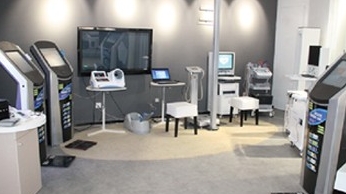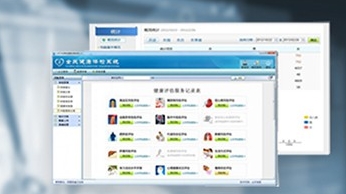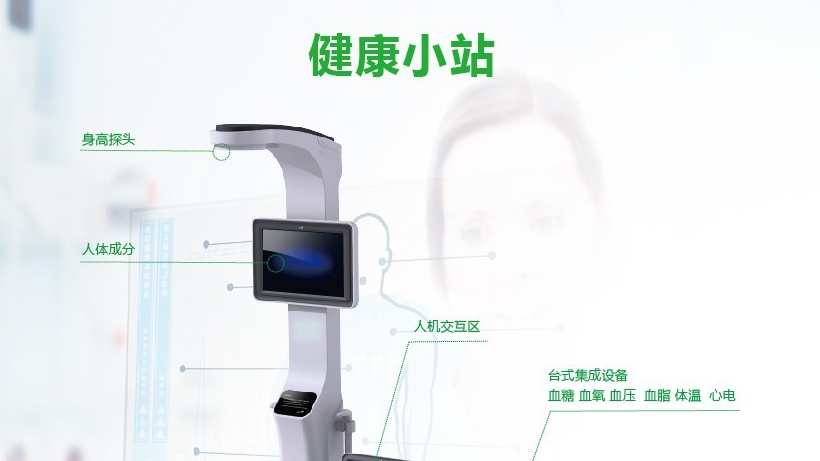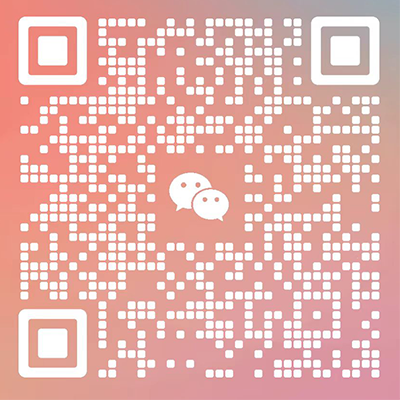 濟(jì)南易享醫(yī)療科技有限公司
濟(jì)南易享醫(yī)療科技有限公司
服務(wù)熱線:李先生18553158035
聯(lián)系地址:濟(jì)南市市中區(qū)歐亞大觀商都
隨訪一體機(jī):康復(fù)路上的 “智能教練”
在健康管理的賽道上,隨訪一體機(jī)正從單純的數(shù)據(jù)采集工具升級為全周期健康守護(hù)的 “多面手”。對于需要康復(fù)護(hù)理的人群來說,它是否能化身貼心的 “智能教練”,提供精準(zhǔn)的康復(fù)指導(dǎo)?答案藏在其功能設(shè)計(jì)的細(xì)節(jié)里 —— 從基礎(chǔ)的健康建議到復(fù)雜的術(shù)后康復(fù)方案,隨訪一體機(jī)正用技術(shù)與人文的融合,重塑康復(fù)指導(dǎo)的模式。
On the track of health management, the follow-up all-in-one machine is upgrading from a simple data collection tool to a "versatile" full cycle health guardian. Can it become a caring 'smart coach' for people in need of rehabilitation care, providing precise rehabilitation guidance? The answer lies in the details of its functional design - from basic health advice to complex postoperative rehabilitation plans, the follow-up all-in-one machine is using the integration of technology and humanities to reshape the mode of rehabilitation guidance.
一、康復(fù)指導(dǎo):隨訪一體機(jī)的 “核心技能”
1、 Rehabilitation guidance: the "core skills" of the follow-up all-in-one machine
隨訪一體機(jī)的康復(fù)指導(dǎo)功能,并非簡單的信息推送,而是基于多維數(shù)據(jù)的智能決策。設(shè)備通過內(nèi)置傳感器或外接設(shè)備,實(shí)時(shí)采集用戶的生理指標(biāo)(如血壓、血糖、心率)、運(yùn)動(dòng)數(shù)據(jù)(步數(shù)、卡路里消耗)、生活習(xí)慣(睡眠時(shí)長、飲食記錄)等,再結(jié)合用戶的疾病史、手術(shù)記錄或當(dāng)前健康狀態(tài),生成個(gè)性化康復(fù)方案。例如,一位剛完成膝關(guān)節(jié)置換手術(shù)的患者,設(shè)備會根據(jù)術(shù)后復(fù)查的 X 光片數(shù)據(jù)(若接入醫(yī)院系統(tǒng))、關(guān)節(jié)活動(dòng)度檢測結(jié)果,以及每日步態(tài)分析,制定分階段的康復(fù)計(jì)劃:術(shù)后 1 周以臥床抬腿訓(xùn)練為主,第 2 周加入助行器站立練習(xí),第 4 周開始漸進(jìn)式步態(tài)訓(xùn)練,每個(gè)階段的動(dòng)作幅度、頻率都有明確指導(dǎo),避免因過度活動(dòng)造成二次損傷。
The rehabilitation guidance function of the follow-up all-in-one machine is not simply information push, but intelligent decision-making based on multidimensional data. The device collects real-time physiological indicators (such as blood pressure, blood sugar, heart rate), exercise data (steps, calorie consumption), lifestyle habits (sleep duration, diet records), etc. of the user through built-in sensors or external devices, and combines them with the user's disease history, surgical records, or current health status to generate personalized rehabilitation plans. For example, for a patient who has just completed knee replacement surgery, the equipment will develop a phased rehabilitation plan based on postoperative X-ray data (if connected to the hospital system), joint range of motion detection results, and daily gait analysis: one week after surgery, the main focus will be on bed rest leg lifting training, the second week will include walker standing exercises, and the fourth week will start progressive gait training. The amplitude and frequency of each stage's movements are clearly guided to avoid secondary injuries caused by excessive activity.
二、分層分類:為不同康復(fù)需求 “量體裁衣”
2、 Hierarchical classification: Tailored to different rehabilitation needs
1. 慢性病康復(fù):從 “控指標(biāo)” 到 “改習(xí)慣”
1. Chronic disease rehabilitation: from "controlling indicators" to "changing habits"
針對高血壓、糖尿病等慢性病患者,隨訪一體機(jī)的康復(fù)指導(dǎo)聚焦于生活方式干預(yù)與用藥管理。以糖尿病患者為例,設(shè)備會根據(jù)連續(xù)血糖監(jiān)測數(shù)據(jù),識別餐后血糖波動(dòng)較大的時(shí)段,自動(dòng)推送飲食調(diào)整建議:“今日 14:00 血糖峰值達(dá) 11.2mmol/L,建議午餐減少精制碳水?dāng)z入,增加綠葉蔬菜比例”;同時(shí),結(jié)合運(yùn)動(dòng)手環(huán)采集的心率數(shù)據(jù),推薦適合的運(yùn)動(dòng)方案 ——“餐后 1 小時(shí)快走 20 分鐘,保持心率在(220 - 年齡)×60%~70% 區(qū)間”。對于需要注射胰島素的患者,設(shè)備還會同步用藥記錄,提醒注射時(shí)間并核對劑量,避免漏打或錯(cuò)打。
For patients with chronic diseases such as hypertension and diabetes, the rehabilitation guidance of the follow-up all-in-one machine focuses on lifestyle intervention and medication management. Taking patients with diabetes as an example, the equipment will identify the period of time when the blood sugar fluctuates greatly after meals according to the continuous blood sugar monitoring data, and automatically push suggestions for diet adjustment: "The peak blood sugar reached 11.2 mmol/L at 14:00 today, and it is recommended to reduce the intake of refined carbon and water for lunch and increase the proportion of green leafy vegetables"; At the same time, based on the heart rate data collected by the sports wristband, a suitable exercise plan is recommended - "brisk walking for 20 minutes 1 hour after a meal, keeping the heart rate in the range of (220- age) x 60%~70%". For patients who require insulin injections, the device will also synchronize medication records, remind injection time and verify dosage to avoid missed or incorrect injections.
2. 術(shù)后康復(fù):全周期追蹤的 “數(shù)字陪護(hù)”
2. Postoperative rehabilitation: "digital accompaniment" for full cycle tracking
術(shù)后患者的康復(fù)指導(dǎo)更強(qiáng)調(diào)精準(zhǔn)性與安全性。隨訪一體機(jī)可接入醫(yī)院的電子病歷系統(tǒng),獲取手術(shù)類型、創(chuàng)口位置、麻醉方式等信息,聯(lián)合康復(fù)醫(yī)學(xué)科的標(biāo)準(zhǔn)流程,生成階段性康復(fù)方案。例如,乳腺癌術(shù)后患者,設(shè)備會在拔除引流管后,指導(dǎo)上肢淋巴水腫預(yù)防訓(xùn)練:“每日 3 次爬墻運(yùn)動(dòng),每次從肩關(guān)節(jié)水平開始,逐步抬高至耳朵后方,配合握拳 - 松手循環(huán)訓(xùn)練,每次 10 分鐘”;同時(shí),通過攝像頭(需用戶授權(quán))遠(yuǎn)程指導(dǎo)家屬協(xié)助進(jìn)行瘢痕按摩,避免因操作不當(dāng)導(dǎo)致的關(guān)節(jié)粘連。對于脊髓損傷患者,設(shè)備還能聯(lián)動(dòng)康復(fù)輔具(如電動(dòng)輪椅、站立架),根據(jù)神經(jīng)功能恢復(fù)進(jìn)度,動(dòng)態(tài)調(diào)整輔具使用參數(shù),實(shí)現(xiàn) “評估 - 指導(dǎo) - 訓(xùn)練” 閉環(huán)。
The rehabilitation guidance for postoperative patients emphasizes more on precision and safety. The follow-up all-in-one machine can be connected to the hospital's electronic medical record system to obtain information such as surgical type, wound location, anesthesia method, etc., and generate phased rehabilitation plans in conjunction with the standard procedures of the rehabilitation medicine department. For example, for patients with breast cancer after surgery, the equipment will guide the upper limb lymphedema prevention training after the drainage tube is pulled out: "climbing the wall three times a day, starting from the shoulder joint level each time, and gradually lifting to the back of the ear, with clenching and releasing circulation training, 10 minutes each time"; At the same time, remote guidance through cameras (with user authorization) is provided to assist family members in scar massage, avoiding joint adhesions caused by improper operation. For patients with spinal cord injury, the equipment can also be linked with rehabilitation aids (such as electric wheelchairs, standing frames), dynamically adjusting the parameters of the aids according to the progress of neurological function recovery, achieving a closed-loop of "evaluation guidance training".
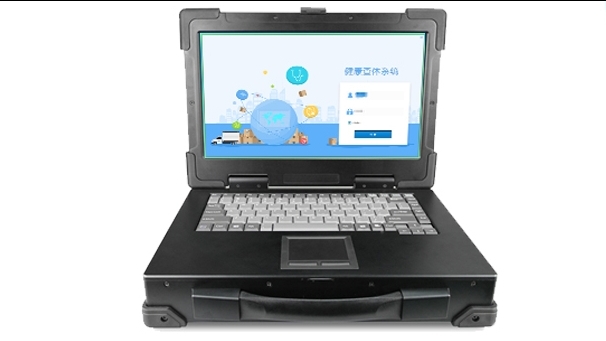
3. 亞健康與功能康復(fù):主動(dòng)健康的 “私人教練”
3. Sub health and Functional Rehabilitation: A Personal Coach for Proactive Health
針對亞健康人群(如久坐導(dǎo)致的頸椎不適、產(chǎn)后盆底肌松弛),隨訪一體機(jī)提供預(yù)防性康復(fù)指導(dǎo)。以頸椎康復(fù)為例,設(shè)備通過智能穿戴設(shè)備監(jiān)測用戶的低頭時(shí)長與頸部姿態(tài),當(dāng)檢測到 “連續(xù)低頭超過 40 分鐘且頸椎前傾角度>30°” 時(shí),立即推送預(yù)警并啟動(dòng)康復(fù)模塊:“請立即起身,進(jìn)行‘米字操’練習(xí) —— 頭部緩慢寫‘米’字,每個(gè)方向保持 3 秒,重復(fù) 5 次”;同時(shí),結(jié)合頸椎 MRI 影像數(shù)據(jù)(若用戶上傳),推薦適合的牽引器使用方式與睡眠枕頭高度。對于產(chǎn)后女性,設(shè)備會根據(jù)盆底肌電檢測結(jié)果(需外接電極片),生成凱格爾運(yùn)動(dòng)計(jì)劃:“每日 3 組,每組收縮盆底肌 5 秒后放松,逐漸增加至 10 秒,配合呼吸訓(xùn)練避免腹部用力”,并通過動(dòng)畫演示正確的發(fā)力部位,降低自行練習(xí)的錯(cuò)誤率。
For sub healthy individuals (such as cervical discomfort caused by prolonged sitting and postpartum pelvic floor muscle relaxation), the follow-up all-in-one machine provides preventive rehabilitation guidance. Taking cervical spine rehabilitation as an example, the device monitors the user's bowing time and neck posture through intelligent wearable devices. When it detects "continuous bowing for more than 40 minutes and cervical forward tilt angle>30 °", it immediately pushes a warning and starts the rehabilitation module: "Please get up immediately and practice the 'rice exercise' - slowly write the 'rice' character on the head, hold for 3 seconds in each direction, repeat 5 times"; At the same time, based on cervical MRI imaging data (if uploaded by the user), recommend suitable traction device usage and sleep pillow height. For postpartum women, the device will generate a Kegel exercise plan based on the results of pelvic floor electromyography (requiring external electrodes): "3 groups per day, each group contracts the pelvic floor muscles for 5 seconds and then relaxes, gradually increasing to 10 seconds, combined with respiratory training to avoid abdominal exertion", and use animation to demonstrate the correct force application area to reduce the error rate of self practice.
三、技術(shù)賦能:讓康復(fù)指導(dǎo)更 “聰明”
3、 Technology Empowerment: Making Rehabilitation Guidance Smarter
隨訪一體機(jī)的康復(fù)指導(dǎo)功能,背后是多重技術(shù)的支撐:
The rehabilitation guidance function of the follow-up all-in-one machine is supported by multiple technologies:
AI 算法建模:基于數(shù)萬例康復(fù)病例數(shù)據(jù),建立不同疾病的康復(fù)軌跡模型,例如 “腦卒中患者上肢功能恢復(fù)曲線”“冠心病術(shù)后心臟功能儲備提升模型”,當(dāng)用戶的康復(fù)進(jìn)度偏離正常軌跡(如關(guān)節(jié)活動(dòng)度增長過慢、心肺耐力提升停滯),設(shè)備會自動(dòng)標(biāo)記并提示調(diào)整方案。
AI algorithm modeling: Based on tens of thousands of rehabilitation case data, establish rehabilitation trajectory models for different diseases, such as the "upper limb function recovery curve for stroke patients" and the "postoperative cardiac function reserve improvement model for coronary heart disease". When the user's rehabilitation progress deviates from the normal trajectory (such as slow increase in joint mobility or stagnant improvement in cardiovascular endurance), the device will automatically mark and prompt adjustment plans.
多模態(tài)交互:通過圖文、動(dòng)畫、語音等多種形式呈現(xiàn)指導(dǎo)內(nèi)容。例如,針對視力不佳的老年患者,語音講解 “踝泵運(yùn)動(dòng)” 的步驟并配合肢體觸覺反饋(通過振動(dòng)提示發(fā)力部位);對于文化程度較低的用戶,用動(dòng)畫演示 “胰島素注射部位輪換方法”,避免文字理解偏差。
Multimodal interaction: presenting guidance content through various forms such as graphics, animations, and voice. For example, for elderly patients with poor vision, the steps of "ankle pump exercise" are explained through voice and accompanied by tactile feedback of the limbs (using vibration to indicate the point of application); For users with lower educational levels, use animation to demonstrate the "insulin injection site rotation method" to avoid misunderstandings of the text.
動(dòng)態(tài)數(shù)據(jù)整合:實(shí)時(shí)同步用戶的康復(fù)效果數(shù)據(jù),如糖尿病患者的糖化血紅蛋白每 3 個(gè)月更新一次,設(shè)備會根據(jù)最新結(jié)果調(diào)整飲食與運(yùn)動(dòng)方案;術(shù)后患者的傷口愈合情況(通過用戶上傳的照片分析)若出現(xiàn)紅腫或滲液,立即觸發(fā) “建議線下復(fù)診” 的預(yù)警,并附上傷口護(hù)理的臨時(shí)指導(dǎo)措施。
Dynamic data integration: the user's rehabilitation effect data is synchronized in real time, for example, the glycosylated hemoglobin of diabetes patients is updated every three months, and the device will adjust the diet and exercise program according to the latest results; If there is redness, swelling or exudation in the wound healing of the postoperative patient (analyzed through photos uploaded by the user), immediately trigger the warning of "suggest offline follow-up" and attach temporary guidance measures for wound care.
本文由隨訪一體機(jī)友情奉獻(xiàn).更多有關(guān)的知識請點(diǎn)擊:http://www.zhihebz.com我們將會對您提出的疑問進(jìn)行詳細(xì)的解答,歡迎您登錄網(wǎng)站留言.
This article is a friendly contribution from the Home Signature Workstation For more information, please click: http://www.zhihebz.com We will provide detailed answers to your questions. You are welcome to log in to our website and leave a message
相關(guān)文章 / Recommended news
- 家簽工作站助力基層衛(wèi)生健康服務(wù)提檔升級
- 智慧公衛(wèi)體檢系統(tǒng)驅(qū)動(dòng)基層公共衛(wèi)生服務(wù)智能化轉(zhuǎn)型
- 家簽工作站在健康管理與生活服務(wù)中的應(yīng)用
- 慢病隨訪包:打通慢病管理最初百米
- 健康一體機(jī):15分鐘,完成一次全面的健康自查
- 基層公衛(wèi)突遇集體需求?易享健康一體機(jī)來解難
- 隨訪一體機(jī):超給力的公衛(wèi)老年人體檢設(shè)備
- 家簽隨訪包:家庭醫(yī)生簽約免費(fèi)服務(wù)到底是啥?
- 慢病隨訪包,助力基層醫(yī)療服務(wù)發(fā)展
- 公衛(wèi)隨訪箱--健康預(yù)防管理的倡導(dǎo)者
